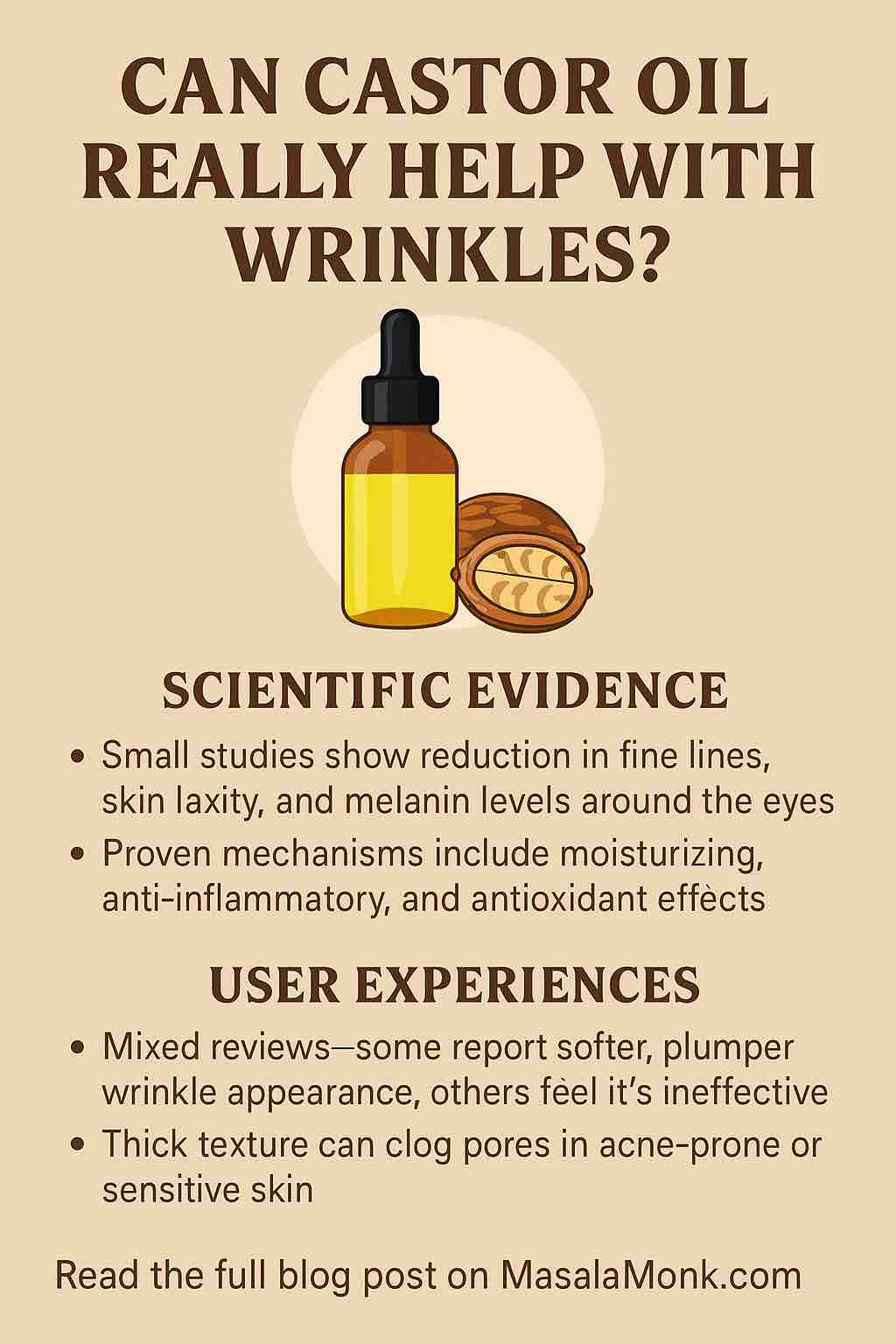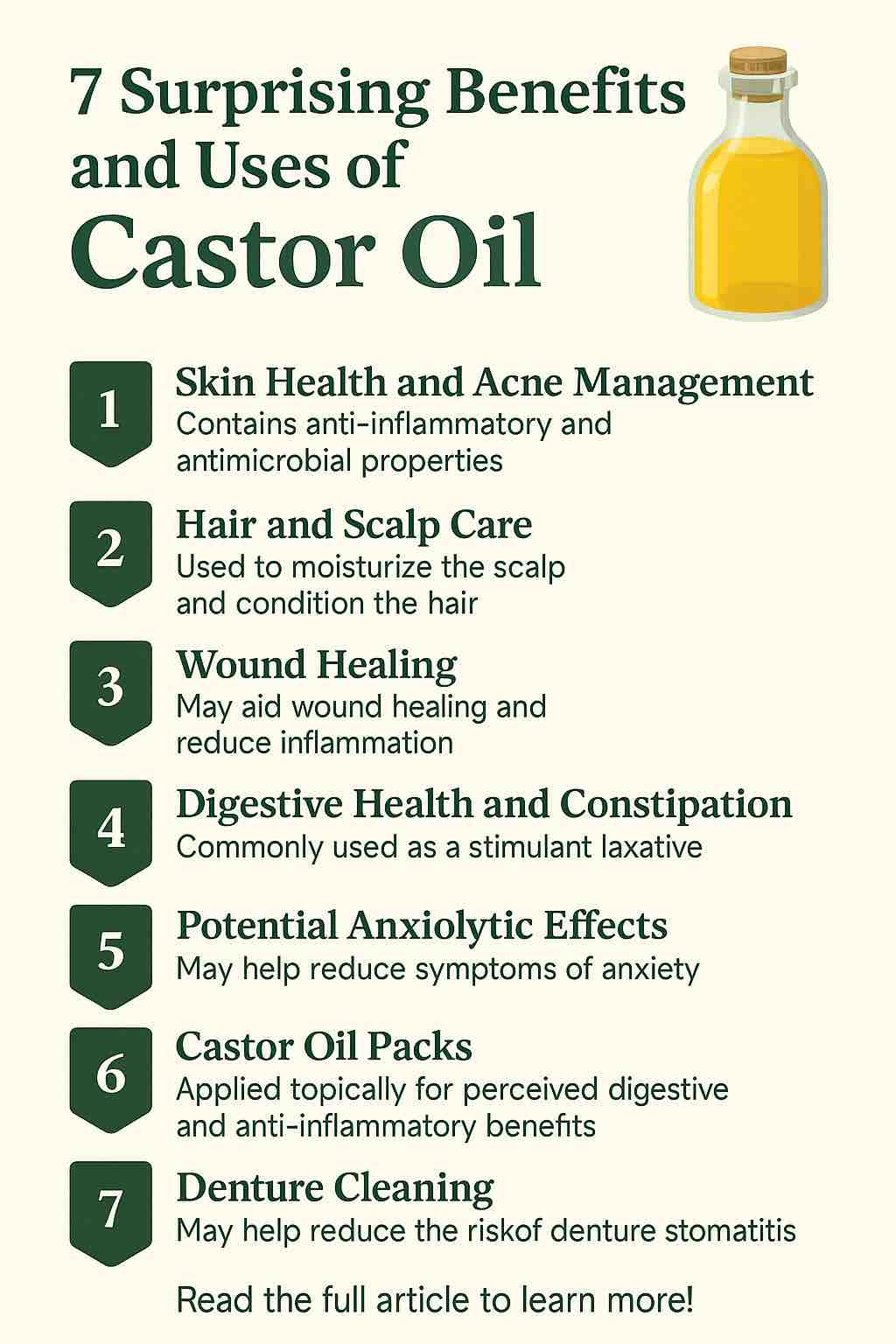
Wrinkles are one of the most visible signs of aging, and the search for natural, effective treatments is never-ending. Among the many oils that claim to fight the fine lines of time, castor oil has gained considerable attention. But can this thick, sticky oil really turn back the clock on your skin? In this post, we explore the science behind castor oil, peer-reviewed studies, and real user experiences to answer this important question in depth.
What is Castor Oil?
Castor oil is a vegetable oil extracted from the seeds of the Ricinus communis plant. It is primarily composed of ricinoleic acid (a monounsaturated fatty acid), along with oleic and linoleic acids. The oil is known for its anti-inflammatory, antimicrobial, and deeply moisturizing properties. Traditionally used for hair growth, digestive issues, and wound care, it has recently garnered attention in the skincare space—particularly for wrinkle prevention and treatment.
The Science Behind Castor Oil and Wrinkles
While the cosmetic use of castor oil dates back centuries, modern science is beginning to validate some of its benefits. Here’s a closer look at the mechanisms by which castor oil may support skin health and reduce the appearance of wrinkles:
1. Occlusive Moisturization
One of the most immediate and observable benefits of castor oil is its ability to lock in moisture. As an occlusive, it forms a barrier on the skin that prevents water loss. This results in better skin hydration, which can temporarily plump fine lines and make wrinkles less visible. Skin that is well-hydrated tends to look smoother, more elastic, and younger.
2. Antioxidant and Anti-inflammatory Properties
Ricinoleic acid, the dominant fatty acid in castor oil, has been shown in lab settings to reduce oxidative stress in cells. It works by neutralizing free radicals—unstable molecules that damage collagen and accelerate aging. Additionally, the oil’s anti-inflammatory properties can calm irritation and reduce skin stress, which may indirectly support wrinkle reduction.
3. Stimulation of Collagen and Elastin Production
There is some anecdotal and limited experimental evidence suggesting that castor oil may stimulate the production of collagen and elastin, two proteins essential for maintaining youthful, firm skin. While no large-scale human studies confirm this conclusively, topical application over time appears to encourage a smoother, firmer skin texture in some individuals.
Recent Clinical Studies and Findings
Recent studies provide more concrete insights into the potential benefits of castor oil in skincare:
Study 1: Anti-Aging Cream Containing Castor Oil (2023)
A clinical study involving 22 participants applied a castor oil-based cream to the eye area for two months. The results showed a 33% reduction in the depth of crow’s feet wrinkles. Additionally, participants noted improvements in skin texture and tightness. This study provides early but encouraging evidence for castor oil’s wrinkle-reducing potential.
Study 2: Castor Oil for Periorbital Hyperpigmentation and Wrinkles (2021-2022)
Another study, published in a peer-reviewed dermatology journal, observed the effects of twice-daily application of castor oil cream over 8 weeks. Researchers found significant reductions in melanin levels, skin laxity, and fine lines. Though the sample size was small (22 individuals), the study’s methodology and measurable results add credibility to the efficacy of castor oil.
These studies suggest that while castor oil may not reverse deep wrinkles, it may be effective in preventing fine lines and improving overall skin quality when used consistently.
✅ Summary
| Aspect | Insight |
|---|---|
| Effectiveness | Hydrates well; may reduce wrinkle appearance short-term |
| Scientific Evidence | Weak for wrinkle treatment; stronger for moisturizing |
| User Sentiment | Mostly positive for texture/hydration; mixed on wrinkle effect |
| Best Use | As an occlusive at night, in small amounts or diluted |
| Warnings | Thick texture; may not suit oily or acne-prone skin |
Real User Experiences: What the Public Says
Positive Feedback
Across user-generated content platforms such as Reddit, Quora, and RealSelf, the general sentiment is cautiously optimistic:
- Many users report noticeable improvements in skin hydration and softness within days of starting use.
- Several long-term users say that regular nighttime application helped reduce the visibility of fine lines, especially around the eyes and forehead.
- Blending castor oil with lighter oils like rosehip, argan, or jojoba made it easier to apply and enhanced absorption.
A common pattern emerged: consistency matters. Those who saw the best results used castor oil daily or nightly for several weeks to months.
Mixed or Negative Experiences
Not every user has a positive experience:
- Acne-prone users report breakouts or clogged pores due to the oil’s comedogenic nature.
- A few individuals experienced fungal acne flare-ups or dermatitis, particularly when using undiluted oil over large areas of the face.
- Some found the thick, sticky texture difficult to manage and preferred mixing or diluting it for easier application.
These results underline the importance of patch testing and individual skin-type consideration before widespread use.
✅ Summary
| Aspect | Insights |
|---|---|
| Efficacy | Clinical studies suggest potential benefits in reducing wrinkles and improving skin elasticity. |
| User Sentiment | Mixed; while many report positive effects, others experience adverse reactions. |
| Best Practices | Conduct a patch test before widespread use; consider blending with other oils to improve texture and absorption. |
| Precautions | Individuals with sensitive or acne-prone skin should exercise caution due to potential for irritation or breakouts. |
How to Use Castor Oil for Wrinkles Safely and Effectively
If you’re considering adding castor oil to your anti-aging skincare regimen, follow these evidence-backed guidelines:
- Choose High-Quality Oil: Look for 100% pure, cold-pressed, hexane-free castor oil. Organic certification is a plus.
- Cleanse Thoroughly: Apply only to freshly washed, dry skin to reduce the risk of trapped bacteria or residue.
- Start Small: Use a small amount—just 1–2 drops is usually enough. Warm it between your fingers before application.
- Target Specific Areas: Apply gently to wrinkle-prone zones like under the eyes, around the mouth, and on the forehead.
- Use at Night: Due to its thick consistency, it’s best used as an overnight treatment.
- Combine Wisely: If desired, mix with a carrier oil like jojoba, rosehip, or squalane to improve texture and reduce pore-clogging risk.
- Patch Test First: Apply to a small area on your inner forearm or jawline and wait 24 hours for any adverse reactions.
Final Verdict: Is Castor Oil a Viable Anti-Wrinkle Solution?
Castor oil is not a miracle cure for wrinkles. It lacks the deep-acting, proven efficacy of medical-grade skincare like retinoids, alpha hydroxy acids, or peptides. However, it offers significant benefits as a hydrating, antioxidant-rich support oil, particularly for those seeking more natural skincare alternatives.
The available clinical data and user reports suggest that when used consistently and appropriately, castor oil can:
- Improve skin hydration and softness
- Reduce the appearance of fine lines and crow’s feet
- Enhance skin texture and elasticity over time
It is best used as part of a holistic skincare routine, not as a standalone treatment. Always consider your skin type and sensitivity level before use.
Have you tried castor oil for wrinkles? Share your experience or questions in the comments below. Let’s build a community of informed, natural skincare enthusiasts!
FAQs: Castor Oil for Wrinkles
1. Can castor oil actually reduce wrinkles?
Castor oil may help reduce the appearance of fine lines and wrinkles due to its moisturizing, anti-inflammatory, and antioxidant properties. While not a cure-all, consistent use can improve skin texture and elasticity.
2. How long does it take to see results from castor oil on wrinkles?
Most users report visible improvements within 4 to 8 weeks of consistent nightly use, though individual results can vary depending on skin type and depth of wrinkles.
3. Is castor oil safe for sensitive or acne-prone skin?
Castor oil is comedogenic and can clog pores in acne-prone individuals. If you have sensitive skin, it’s crucial to patch test first or dilute it with a lighter carrier oil like jojoba.
4. What kind of castor oil is best for wrinkles?
Look for 100% pure, cold-pressed, hexane-free castor oil. Organic certifications can ensure it’s free from harmful residues.
5. Can castor oil replace anti-aging products like retinol?
Not entirely. Castor oil is a supportive treatment but doesn’t replace the proven wrinkle-fighting benefits of ingredients like retinoids or peptides. It works best when used alongside other treatments.
6. How should I apply castor oil to reduce wrinkles?
Use 1–2 drops, warm it between your fingers, and apply gently to wrinkle-prone areas at night. Focus on regions like the forehead, under-eyes, and around the mouth.
7. Can castor oil be used under makeup?
Due to its thick, sticky texture, it’s not ideal under makeup. It’s best used as an overnight treatment rather than a daytime moisturizer.
8. Are there any clinical studies supporting its anti-aging benefits?
Yes. Small-scale studies have shown that castor oil-based creams can reduce fine lines, skin laxity, and melanin levels, particularly around the eye area, over 6 to 8 weeks of use.
9. Can castor oil help with deep wrinkles or only fine lines?
It’s more effective for fine lines and early signs of aging. Deep wrinkles typically require stronger interventions such as retinoids, professional treatments, or fillers.
10. What are common side effects of using castor oil on the face?
Possible side effects include breakouts, clogged pores, or irritation, especially if you use too much or don’t cleanse the skin properly before application.













